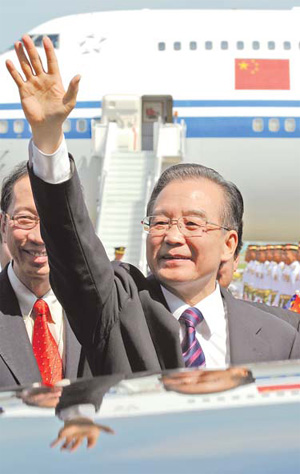Economy
'China should lead over Asian single currency'
By Zhou Yan (China Daily)
Updated: 2011-04-28 07:52
 |
Large Medium Small |
EXCLUSIVE? LIM SIANG CHAI
Malaysia says region's largest economy is crucial to success
KUALA LUMPUR, Malaysia - China should take the lead in formulating a single currency for Asia, given the large size of its economy, suggested Lim Siang Chai, Malaysia's deputy minister of finance.
 |
|
Premier Wen Jiabao waves as he arrives at Kuala Lumpur International Airport on Wednesday for a two-day visit to Malaysia. Saeed Khan / AFP |
A unified currency in Asia, where most countries are emerging economies that might easily attract hot money inflows from industrialized nations, could help diminish the risk of exchange rate fluctuations and help boost the region's trade, said Lim in an exclusive interview with China Daily.
"Without China's leadership, it's hard for Asia to achieve the goal of having a solitary currency," Lim said.
He added that, amid increasing trade between China and the Association of Southeast Asian Nations (ASEAN) since the implementation of the China-ASEAN Free Trade Area, a single currency would also reduce the cost of transactions for the settlement of trade.
The free trade area, the most heavily populated in the world, covers about 1.9 billion people and kicked off on Jan 1, 2010.
Malaysia has been China's biggest trading partner among the 10 ASEAN members for three straight years, while China has been Malaysia's biggest trading partner in the world for two years.
Bilateral trade volume between the two nations rose by 42.8 percent year-on-year to reach $74.3 billion in 2010.
However, compared with the soaring bilateral trade, China's investment in Malaysia remains low, Lim said, adding that Malaysia's government hopes to attract more Chinese investors.
Several Chinese construction firms are in talks with the Malaysian government about investing in a 700-kilometer high-speed railway that will go through Malaysia to connect Thailand with Singapore as part of a high-speed rail link between China's Kunming and Singapore. Talks are also continuing about involvement in an intra-city metro line worth $16.8 billion on which construction is set to start in July.
China possesses advanced high-speed rail technology and has significant experience in building railways, Lim said.
"We hope to extend collaboration in that area."
In addition, Malaysia also plans to attract more Chinese firms to list on the country's stock market. A stationery company based in Fujian province has been approved to float shares in Malaysia in June. The go-ahead follows the first batch of seven Chinese firms that listed in the country last year.
Tajuddin Atan, CEO of Bursa Malaysia, which was formerly called the Kuala Lumpur Stock Exchange, said more Chinese companies started showing an interest in listing in Malaysia after the countries' commercial relationship grew stronger.
"We expect to approve at least six Chinese firms to go public in Malaysia this year," Lim said.
In addition, Lim said the Bank Negara Malaysia, the nation's central bank, has started purchasing yuan-denominated bonds and China's A shares, a move made to foster bilateral financial cooperation over the long term.
The bank bought Chinese stocks and bonds as a licensed Qualified Foreign Institutional Investor, Lim added.
He said Malaysia and China should strengthen ties in the financial sector, which he described as one of the most important areas of cooperation between the two countries.
Malaysia's foreign currency reserves reached $112 billion as of February, which is enough to sustain nine months of imports.
| 分享按鈕 |